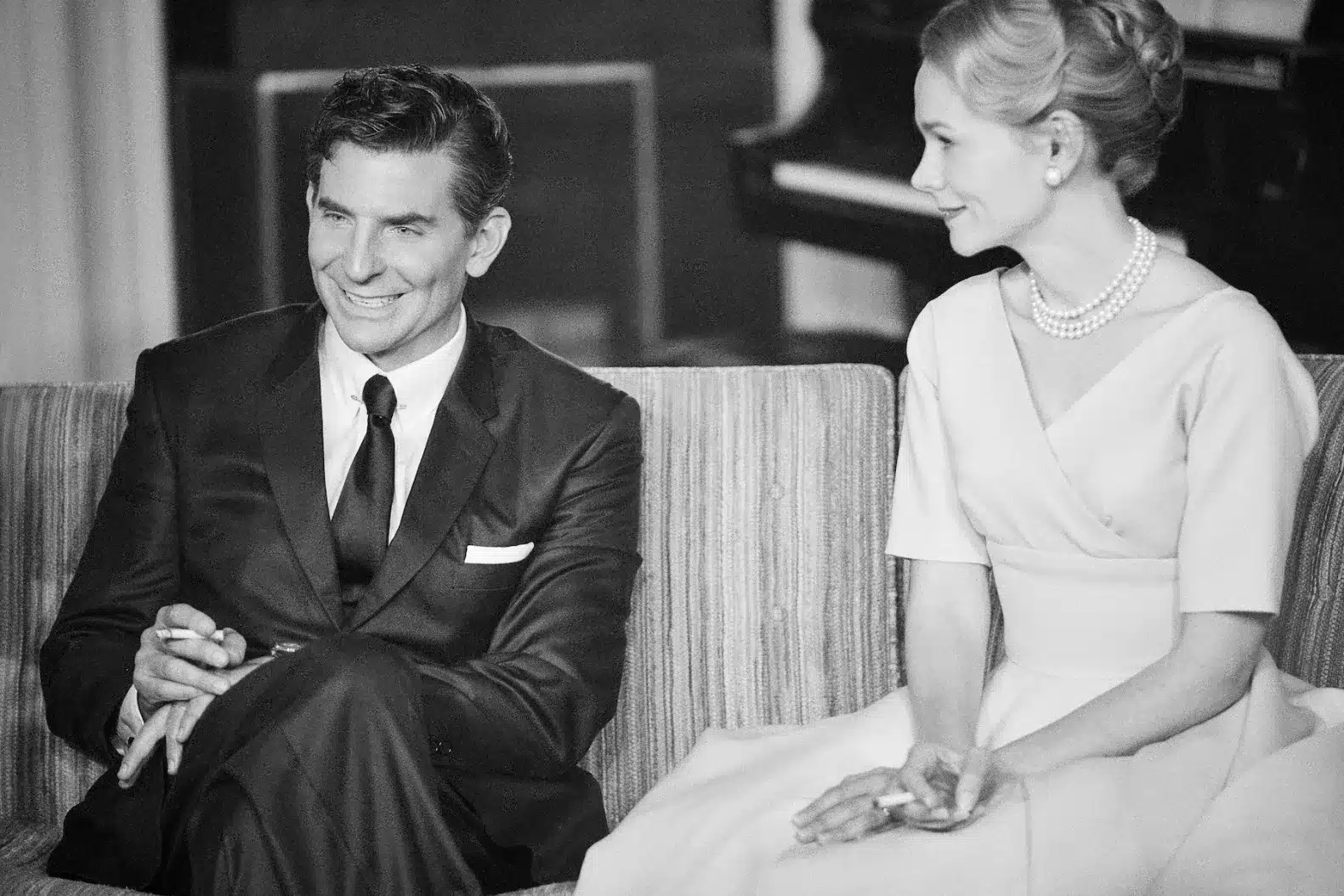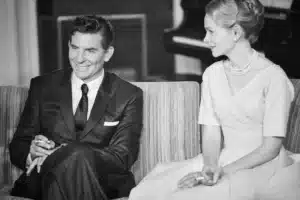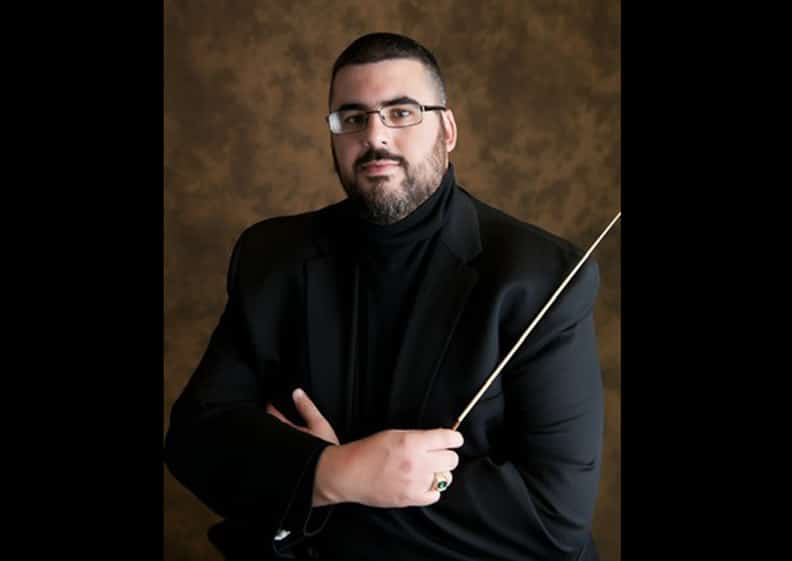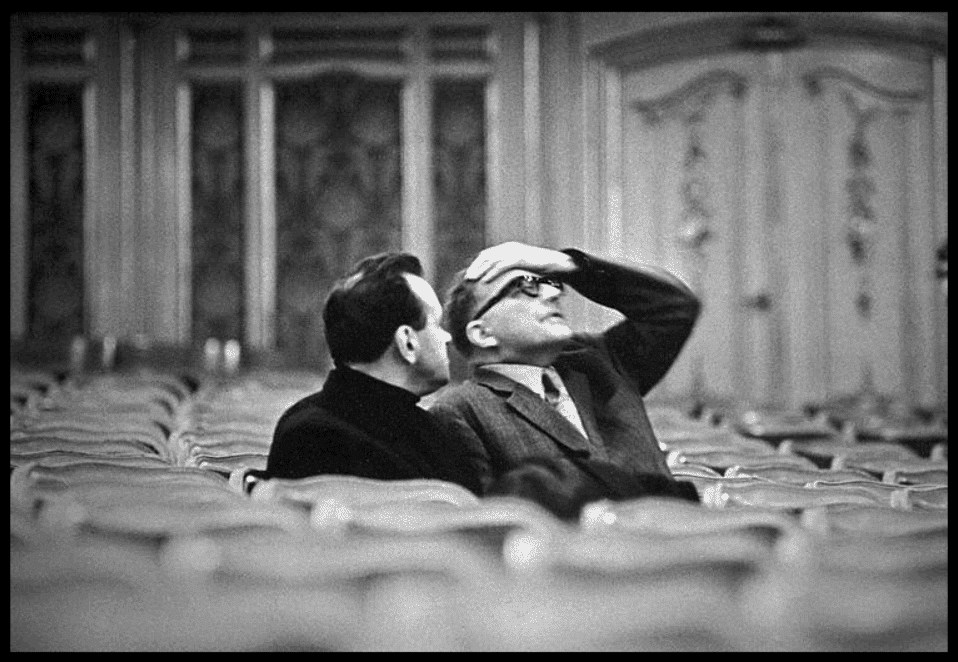What’s missing in Bradley Cooper’s Maestro
NewsThe Leonard Bernstein biopic opened this weekend on a limited release and to mixed reviews. Bradley Cooper acted the central role, directed and co-scripted the film. He was stretched thin at times.
Like most others who had personal experience of Bernstein, I was curious to see how closely Cooper simulated Lenny’s voice and mannerisms. The resemblance was, in a word, astonishing. Cooper was also masked up prosthetically to look enough like his character for us to suspend disbelief for the duration of the film. His imitative conducting, however, lacked traction. The musicians managed without looking up.
Carey Mulligan as Bernstein’s wife Felicia was empathetic and often moving, an obvious Oscar frontrunner. The comedian Sarah Silverman was brilliant as sister Shirley. Scott Ellis was unerringly creepy as Bernstein’s business manager, Harry Kraut. The rest of the cast were flawless and the period costumes were beyond nostalgic.
Cooper’s film centred on Bernstein’s double life as a homosexual and a married father of teenaged children. That was its core script. But this narrow focus occluded Bernstein’s musical significance and the foundations of his duality. In doing so, it distorted its own story.
Consider the background. In 1953, Leonard Bernstein was refused a passport renewal by the State Department on FBI accusations that he was a Communist sympathiser. Overnight, his world shrunk. Unable to conduct in Europe, he turned to US orchestras and often struggled to find work. The Boston Symphony, his hometown orchestra, had rejected him as music director. Unemployed and to some extent intimidated, he turned back to his 1940s pals on Broadway to create a pair of musicals, Candide and West Side Story. The second was box-office gold.
Bernstein’s popular appeal persuaded the New York Philharmonic to offer him its podium in 1957, initially in joint occupation with his mentor Dmitri Mitroupolos. The orchestra was not quite sure at first about Bernstein. As part of its publicity campaign, and to counter media whispers, the Philharmonic highlighted his happy domestic life with Felicia, whom he had married in 1951. She became integral to his public persona, essential for his respectability.
Bernstein revolutionised New York’s repertoire with injections of Mahler, Nielsen, Shostakovich and two-dozen American composers. He launched Saturday morning televised talks for young people at Carnegie Hall, educating a whole American generation in the elements and excitements of orchestral music. He and Felicia were shining lights of New York society, equivalent in fame and glamour to the Kennedys in the White House. The film of West Side Story carried his fame worldwide. He combined the roles of composer, conductor, teacher, social commentator and reformer, too much for one man, one life.
This context was entirely missed in Cooper’s film. Yes, Cooper proved it was possible to tell Bernstein’s story simply through the prism of his homosexuality. But ignoring the political and musical backdrop gave viewers little clue as to why they should care about his character. It reduced Maestro to just another empty two hours of formulaic movie-making.
Coming soon on Netflix.







I agree, the LEAST interesting fact about Bernstein was his sexuality, homo or hetero, his love life was simply not that interesting.
(OK, maybe diehard classical music fans probably found titillating that he and Aaron Copland had sex, but Copland hardly gets your motor running in terms of a romance story, and Cooper only hints at it in one tender scene of them together that you would completely miss if you didn’t know their history.)
I think Cooper was motivated by the homosexual angle as Oscar bait, as in, look at me, Bradley Cooper, kissing men on screen, give me my Academy Award.
“The least interesting aspect”
The govt of the time clearly found it of *considerable* interest as it wasn’t until 1961 that homosexuality began to be decriminalised in the US.
Against a backdrop of this , I think it’s noteworthy .
Lest there be any doubt how homosexuality was perceived in the US here’s an ad from 1955, alerting people to the dangers of it : https://www.pbs.org/video/american-experience-boys-beware/
This should garner more than a few laughs if those pre-released snippets of him conducting in full makeup are any indication……
Don’t let the facts get in the way of your premise, Norman. Maestro has impressive 83% critics score and 92% audience score on RottenTomatoes.com. So much for the supposed mixed” reviews. Sheesh …
Well, you know how “the People” are, though, Carl.
Yes, I’ve seen a lot of reviews from credible, respectable sources (major British and American dailies, news sites, etc.) and “mixed” is hardly an accurate description of what I have seen. Unless you call the range from “rave” to “very positive” a mix.
An 83% score on Rotten Tomatoes does not indicate “mixed reviews.” At worst, it suggests reviews were “generally favorable.”
That said, it’s a shame that the film seemingly does a poor job of portraying why we care about Bernstein at all in the first place, namely, his prodigious talents as a musician and communicator. It’s not hard to divine why the focus should be on his homosexuality, and why Montealegre is made to be the central character in the film, given the current cultural moment. Identitarianism rules the day.
What a pity she wasn’t the central character in Bernstein’s life!!
Sue, she knew full well what she was getting into.
Identitarianism. I get the idea, but is that a real word?
Hanna A. Rand invented it.
No, but I love it! It describes today’s radical chic culture. It’s the essence of Woke and it’s anti-liberal because we use identity to separate ourselves from our common humanity – universal suffrage and the goals of the Enlightenment. I think Copeland and Bernstein embraced Enlightenment aspirations found in Mozart’s opera and Beethoven’s symphonies; in Copland’s Fanfare for the Common Man and Bernstein’s Westside Story. The ironies cooper’s portrayal are painful.
This is how we look now at people in the United States – who they are, and their importance, are reduced to race and who they sleep with. That Bernstein was a household name because of his artistry and personality is secondary.
I absolutely loved those educational concerts from the 1950s, of which I’ve only seen re-runs. Bernstein’s Harvard Norton Lectures were also absolutely superb. The man himself; not so much.
He strode the musical stage like a colossus and that’s no BS.
I can’t wait to see this movie because any movie about a homosexual musician, I mean, how many times does that happen?
Don’t worry, there surely will be many more in the future.
The terms ‘homosexual’ and ‘gay’ are crazy inventions and should be cancelled from language, like the multiple gendering labels.
It is very embarrassing that Mr Bernstein’s private life has been opened-up to be sniffed-through by the masses for entertainment.
That’s our times.
Humphrey Burton documented all this in his biographical tome circa 30 years ago.
I was able to see a New York screening two weeks ago. Overall your assessment is spot on; however, the film is not intended to be a full assessment of a full life and career. It is better understood as a singular focus on the dualities of a creative and passionate life (in love, in music, the personal and the public). Not certain it is formulaic but does it condescend to Hollywood simplification? I think it does. Nonetheless an extremely well made if myopic film well acted.
It’s an interesting but varied genre, the biopic. The one on Johnny Cash, starring the gifted Joaquin Phoenix, is an exemplar of how well these can work. And another very good one is about Ray Charles; brilliantly acted and directed. The biopics from the 40s and 50s were largely risible affairs (eg. Eddy Duchin Story), often either drowning in soapsuds or totally preposterous (eg. Cole Porter biopic “Night and Day”). Of more recent times the biographical treatments have generally fared much better. Those former I’ve mentioned wore an essentially musical livery and audiences were meant to understand and appreciate the composers according to their music.
Every little fault or indiscretion could be airbrushed way with a great song, arrangement or dancing.
Bernstein’s horizontal proclivities are the least important thing about him. And portraying his wife as a martyr is disingenuous – per the existing letter to LB in her own handwriting (available on the Internet) in which she signs on whole-heartedly to his nature.
‘As I grow older and older
And totter toward the tomb,
I find that I care less and less
Who goes to bed with whom’.
Who wrote these lovely lines?
Dorothy L. Sayers
Burma Shave
at last, a truly witty retort to lighten the mood. thank you.
Agree totally NL! This was “just” a movie about a very famous person and his marriage. A very good movie but certainly what was missing was why was this man so important? we didn’t see anything about his incredible multifaceted nature as a musician, composer, educator communicator, celebrity etc. This is the second movie about a great man (the other is Oppenheimer) which does not show why that man was great. I guess we will have to wait for another movie. The documentary The day after Trinity did that for Oppenheimer; hopefully we will get one as good about Bernstein.
But the film was underpinned by his music and music-making. It opened with a relatively atypical piece which seemed to take its cue from Schoenberg op.11.
There’s a decent documentary on Bernstein narrated by Lauren Bacall which will fill in the many (inevitable ) gaps.
A film of this type needs public appeal it is not aimed at hugh intellectuals interested in political details of a celebrity. Other films can deal with this but they will have limited appeal. This is a specious comment and while not incorrect ignores the primary purpose of the film. No single film can cover all aspects of a life for all anticipated viewers.
Very true. One might say that the life of Napoleon is even less comprehensive in a recent film that really has had mixed reviews. But those that support it admit that it is riddled with inaccuracies, while insisting that it is a GREAT film.
They also argue that the makers’ principal responsibility is to make a good MOVIE. It’s a vexed question. Yes, these are not documentaries. But makers know the impact of films and must realise that what they put up on screen will stick in the minds of undereducated audiences, especially the young.
Elizabeth I never met Mary, Queen of Scots, yet one of the most potent scenes in the Mary biopic with Vanessa Redgrave and Glenda Jackson from 1971 is of the pair meeting.
Mr, Lebrecht’s take on Maestro is less with inaccuracy than with emphasis, but it is part of the same question, what a biopic is for. I for one am less interested in it than I was before — like Dorothy Sayers, quoted above, my interest in who sleeps with whom is under firm control. But I may report back once I have seen the film.
Bradley Cooper has talked extensively how the original project was a broad biopic of Bernstein, but he decided that the marriage was the real story and to focus on that.
You can’t say that elements are missing when they weren’t intended to be there in the first place.
They were intended, they just didn’t make the final script. I can only imagine how pressured Cooper was to do this, but the fact that he was given any money at all is pretty miraculous.
Yes okay, they missed stuff, or at the very least it was elided over, but the film wasn’t trying to capture every historical moment; it was above everything trying ( and succeeding) in delivering a wonderful piece of cinema that compresses, elides…and yes distorts, but distills an essence of the man and the life…and any film that includes over 6 minutes of Mahler’s resurrection symphony (filmed in situ in Ely cathedral) is not just skimming along the musical surface. Bravo Bradley!
I very much admire Bradley Cooper and give him credit for attempting this project, even though I have zero interest in seeing it.
His best film, IMO, is “American Sniper” for Clint Eastwood.
There is an excellent documentary called “Bernstein’s Wall” that premiered at Tribeca Film Festival very recently, was well-received by audiences and critics, but simply disappeared: probably because the estate and Bradley Cooper and old Hollywood wanted to own the field. The expense and gate-keeping of licensure makes music films almost impossible these days: https://www.bernsteinfilm.com
Being virtually a shut-in, I’m pretty good at digging out films online, and not all that particular about where I find the more obscure ones. I can tell you there is nary a trace of this 2021 film. Somebody has it locked up.
But how can one see it? Its a mystery!
Select release (to qualify for Oscar consideration) til Netflix brings it to their platform on Dec 20
Bernstein’s Wall, not Maestro… do please keep up!
It was Spielberg who bought the rights (he produced Cooper’s film), and nobody was going to be able to outbid him.
Just saw the film this evening and thought it was excellent. I agree with you that it doesn’t cover enough of Bernstein’s musical genius, however, can a two and a half hours biopic ever realistically portray such a complex and creative personality?
I thought the music scenes were astonishing, especially those including Mahler. Cooper completely immerses himself in the character and looks just like Bernstein. I thought his conducting was really really good. The scenography and costumes are phenomenal, the atmosphere highly authentic… All the actors are first rate, from Cooper and Mulligan to the supporting cast.
Bravo Bradley Cooper, more film like this are needed! However, there were only five people in the huge movie theater, so I wonder how much it is going to gross. Yes, I agree, more music and more of Bernstein’s background was needed, but compared to Blanchett and Tar, this film is a masterpiece.
Contrary to Lebrecht’s statement the 1953 revoking of Bernstein’s passport was reversed within weeks and he toured Europe that fall. Bernstein was never “unemployed”.
Bernstein talked about the confiscation of his passport to the end of his life. It was a destabilising and traumatic experience. I don’t have his worksheets to hand for 1953-55 but this was definitely a low period for conducting engagements.
The passport matter was not made public and thus did not affect his career, though he certainly was upset by it. He took good stretches of time on worthwhile composing periods (On the Waterfront, Serenade and the two Broadway projects.) In 1955 he was quite active as a conductor.
What would be some examples of the “media whispers” at that time?
What publication? What writer?
PBS American Masters Leonard Bernstein Reaching for the Note
https://www.dailymotion.com/video/x8my6mr
I knew this was going to happen, I could feel it. Hollywood is obsessed with showing everyone’s sexual side. But, to be fair, they are actual communists now so they may not have wanted to show that side of the story. P.S. I lived in LA for 20 years, they would love nothing more than to lock all of you inside and get you addicted to your tvs. They would love MAO to come and do that to you.
Hollywood communist???
What a laugh riot.
Hollywood is faaaaaar too obsessed with profits to be communist.
And is *anywhere* other than North Korea properly communist anymore? Even the Chinese Communist Party barely bothers to pretend to be communist anymore, which is why the People’s Republic (should that be in scare quotes?) became an economic power.
Your idiotic McCarthyist red-baiting aside, traditional Stalinist Communists are quite homophobic (as are their imitators like Putin) so it hardly follows that a “communist film industry” would seek to spotlight Bernstein’s sexuality.
As one of the kids who attended Bernstein’s conceived, written, and “performed” Young People’s Concerts, and a devoteé of his music, and even more, of his astounding ability to make all things musical, fun & understandable and relevant to non-musical aspects of life, through my 78 years, I can attest to his importance, regardless of his sexual proclivities or other aspects of his life & make up. The personal aspects & relationships are significant when fully exploring who he was and how such may have influenced and been influenced by his musical and communication genius and uniqeness. It would seem that to criticize a film that does not have all of these aspects of “Lenny” is to say that any film about him that is less than 5 – 6 hours duration is doomed to inadequacy. Certainly, his incredibly broad knowledge, musical genius, Infectious enthusiasm & love for music, and astounding ability to convey & communicate it all, makes him the greatest musical educator for non-musicians in history.
I got to watch Maestro yesterday – along with a rehearsal pianist, rising conductor and protege who worked with Bernstein for quite some time in New York and later in Europe. He thought it was a good movie that didn’t try to do too much and like the focus on one aspect of Bernstein’s life. And…his sexuality was an important part of it. If you want to learn more about Bernstein’s whole life read Humphrey Burton’s unmatched biography. For the more salacious details, get Charlie Harmon’s unflinching book. I’m just waiting for that huge Sony big box. All that matters is the man’s music making. And that was fantastic.
I’ve just read Humphrey Burton’s huge and enthralling life of LB. Even there, things are glossed over or missing, perhaps because the original ms was too dam long. What emerges, however, is a sense of LB’s colossal talents and energy. I haven’t seen the movie, but hey, it’s Bradley Cooper’s vision of LB, his shopping list is necessarily different from others’, as his angle of vision is different. At least he seems to have avoided the deadly “this happened, then this happened” of the biopic genre.
I’ve just been discussing biopics with someone who reviews films professionally for a major English daily. “This happened, then this happened” is not how they usually go. Every life is chronological but biopics rarely “cover” a life. That’s for docos. They usually focus on an aspect, or even an incident, that has caught the imagination of whoever wants to make it.
It’s not a biopic. This has been made clear at every point. You choose to ignore it.
Who needs a Hollywood film when there are plenty of videos available of the real person?
Need has nothing to do with it. Please do not reduce any critique of a film to the fact that there are “plenty of videos available.” A film is an artistic endeavour, and an artist is drawn to a range of subjects.
Cooper was drawn to Bernstein. He has given us a version — his — of that other great artist. By most accounts it is done very well. Neither Cooper nor anyone behind the film is claiming that this is ALL of Bernstein — it is an approach to a man he clearly admires through elements HE seems to deem central. Others may disagree — that is fair enough, and essentially what happens in real life — we all see people differently.
I have yet to see it, though I have seen many of your videos, and I still remember Bernstein’s concerts for young people from my own childhood. I also remember, in my first year at university, a little seminar class that included an analysis of a book of Tom Wolfe’s essays. One was called Radical Chic and as I recall seemed centred on a party the Bernsteins gave at their apartment where attendees included Black Panthers or some similar campaigners. It gave me a whole new aspect of Bernstein’s life, enriching my picture of him.
If Cooper’s picture opens up more of the man, that surely enriches your videos. I did not go around thinking of Bernstein as a radical after that essay, but he seemed more than he had when I had previously watched him, when he was “just” the conductor.
Judging from what I read about the film (and I am waiting for it to come on Netflix), there definitely is so much missing in this movie, so much that if Cooper had decided to make this a true biopic, the film would be epic in many ways including length (3+ hours, to be precise).
Several key figures are missing from this film including his piano teacher (and later secretary) Helen Coates, Marc Blitzstein, Dimitri Mitropoulos, David Diamond, Ned Rorem and Lukas Foss (given Hollywood’s penchant for combining real-life people into one fictional composite person, it would have been nice to have seen the three composers I mentioned written as such), and I don’t know if Cooper placed in the film the party Bernstein threw to support the Black Panthers, or even have a quick mention of Andre Watts or James DePriest (who was Bernstein’s assistant conductor during the NYPO’s 1965-66 season after winning the Mitropoulos conducting competition), which would also reinforce, to some degree, Bernstein’s part in endorsing Black musicians and the Civil Rights movement. If these are omitted, even in verbal passing, Cooper really did miss the point, which leads me to wonder if Jake Gyllenhaal would have included some of these issues in his intented biopic of Bernstein, which will never be made.
No none of that is included.
If you want to make that movie, by all means feel free. Cooper clearly did not — this is art, not non-fiction — and chaque a son gout should apply, should it not?
Chacun, s’il vous plaît.
Movies are not art. They are movies.
The truth about LB’s private life couldn’t be put into a movie, due to the lawsuits it would engender. Akin to writing about Levine or other ‘controversial’ figures. As for the film: Nézet-Séguin wants our praise for teaching Cooper how to ‘conduct’… perhaps he should have spent the time learning his opera scores?………….
Bernstein’s Young People’s Concerts were on Sunday afternoons, at least the ones that I saw. Back when the networks would show programs besides just football during that time slot.
Just a subjective comment re:
“His imitative conducting, however, lacked traction. The musicians managed without looking up.”
Most musicians only look up at the conductor at the downbeat, at a dramatic pause or break in the score and at the final measure. They’re reading their music keeping the conductor in the corner of their vision. In addition certain measures may have
penciled notations to “watch.”
In addition, Bradley Cooper studied with Yannick Nezet-Seguin, the brilliant and charismatic conductor of the Philadelphia Orchestra. In addition Cooper wore an earpiece with Yannick coaching him during filming. But of course there was only one Bernstein.
However, the true brilliance of a conductor is how he/she rehearses the orchestra, interprets the composition and brings the best out of their musicians.
The critique seems to demand a 360 degree turn in the small world of a personal film. No comment on the music as presented and conducted…seems a bit small and snide overall!
I agree with this assessment. In short – too little music. Where was West Side Story, apart from a few snippets in the background score? Just another detail – the chain-smoking was beyond belief.
Yes. The problem with watching 50s ,60s, 70s, movies , is all the smoking. Makes me cough. Yes, they smoked. But please less in the movie
Joan Peyser’s tell-all biography of Bernstein puts his homosexuality in the context of his densely packed, illustrious career and requires 480 pages to do it. Cooper’s movie title ‘Maestro’ is disingenuous in pretending to do something similar for the screen. I haven’t seen the film but it sounds like a more fitting title would be ‘Bernstein – The Sex Life of A Famous Conductor’.
“Composer, conductor, teacher, social commentator and reformer” should include pianist. His Schumann Piano Quartet and Quintet recording with the Juilliard Quartet is proof of his excellence.
Leonard Bernstein is the greatest classical musician America has ever produced. No single movie could possibly capture all he accomplished.
The movie failed. I met up with Jamie Bernstein (Lenny’s daughter) a few years ago, when she appeared at the SF Jewish Community Center to promote her book Famous Father girl. There was a big screen mounted, showcasing a black and white film of Lenny in Europe conducting the choral movement of Beethoven’s 9th, celebrating the fall of the Berlin wall. At the end of Jamie’s lecture, she let us in on the planning of a biopic, with Steven Spielberg attached, and she mentioned an actor who might be playing her father. (It wasn’t Bradley Cooper) I winced.. and was worried about the fake conducting aspect of such a movie. I watched it yesterday and found the premise or theme, weak, and unfulfilling and primarily an injustice to the creative genius of Bernstein, expressed in so many forms. If I juxtapose the film JUDY (biopic of Judy Garland) I can attest to its wonderful layering of events in the singer’s life—-and by its depth and poignancy having substance and emotional meaning. Not so with Maestro-a movie that should have been titled Felicia.